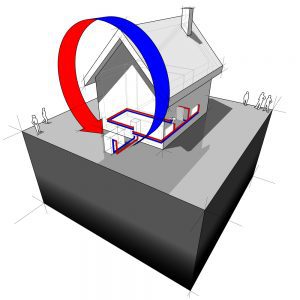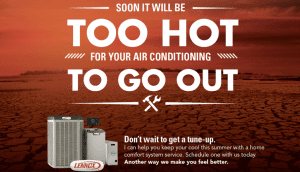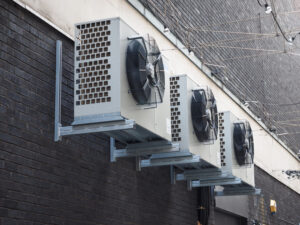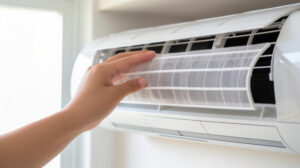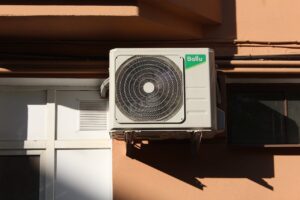Keeping your home cool and comfortable involves more than just having a reliable air conditioning unit. One crucial aspect that often gets overlooked is the air conditioner filter. Choosing the right air conditioner filter can significantly impact the performance of your HVAC system, as well as the air quality in your home. Our professionals at Long Heating and Cooling understand this, and we want to help guide you in making the best choice for your specific needs.
From understanding the different types of filters to knowing when to replace them, we aim to equip you with valuable information to keep your HVAC system running smoothly. Let’s explore how to choose the right air conditioner filter for your home and ensure your system remains in top condition.
Understanding Different Types of Air Conditioner Filters
The first step in choosing the right air conditioner filter is understanding the different types available. Each type of filter has its own set of benefits and purposes, making it crucial to select one that fits your specific needs.
- Fiberglass Filters: These are the most basic and inexpensive types. They are disposable and intended to protect your HVAC system rather than improve indoor air quality. They catch larger particles like dust and lint but are not as effective at capturing smaller pollutants.
- Pleated Filters: These filters are made of polyester or cotton and have a greater surface area than fiberglass filters. They are more effective at catching smaller particles, such as mold spores and pet dander, and improve overall air quality.
- Electrostatic Filters: Electrostatic filters use self-charging fibers to attract and hold contaminants. These filters can be reusable or disposable and are excellent at capturing a range of particle sizes, making them suitable for homes with pets or smokers.
- HEPA Filters: High-Efficiency Particulate Air (HEPA) filters are capable of trapping 99.97% of airborne particles. These are typically used in environments requiring advanced air filtration but are not always compatible with standard residential HVAC systems.
- Activated Carbon Filters: These filters are effective at removing odors and certain gases. They can be used in conjunction with other types of filters to enhance air quality, especially in homes prone to strong smells or volatile organic compounds (VOCs).
Key Factors to Consider When Choosing an Air Conditioner Filter
Choosing the right air conditioner filter involves evaluating several important factors. These considerations will help you select a filter that best suits your HVAC system and your home’s specific needs.
- Filter Size and Compatibility: The filter must fit your HVAC system. Our technicians can help you identify the correct dimensions and ensure the filter matches your unit’s requirements. An incorrectly sized filter can reduce efficiency and lead to system issues.
- MERV Rating: The Minimum Efficiency Reporting Value (MERV) rating indicates a filter’s ability to capture particles. Higher MERV ratings mean better filtration but can also restrict airflow if not compatible with your system. Our professionals recommend choosing a filter with a MERV rating appropriate for your HVAC unit and air quality needs.
- Air Quality Needs: Consider the unique needs of your household. Homes with pets, smokers, or occupants with allergies may require higher efficiency filters, like pleated or electrostatic options. For households without these concerns, a basic fiberglass filter may suffice.
- Maintenance and Replacement Frequency: Different filters have varying maintenance requirements and replacement frequencies. Some, like disposable fiberglass filters, need frequent replacement, while others, like electrostatic filters, may be reusable but require regular cleaning. Our technicians provide guidance on maintaining your specific filter type.
- Budget: Your budget plays a role in filter selection. While more expensive filters can offer superior air quality, it’s important to balance the cost with your needs and the frequency of replacement. Our professionals can help you find a filter that strikes the right balance between cost and performance.
Benefits of Using the Right Air Conditioner Filter
Using the correct air conditioner filter brings numerous benefits that contribute to both the efficiency of your HVAC system and the comfort of your home. Choosing the right filter can enhance your overall heating and cooling experience and protect your system from unnecessary wear and tear.
- Improved Air Quality: A high-quality air conditioner filter helps to remove contaminants such as dust, pollen, pet dander, and mold spores from the air. This creates a healthier environment, particularly for individuals with allergies or respiratory issues. Clean air is essential for overall well-being, and the right filter plays a crucial role in maintaining it.
- Increased HVAC Efficiency: When your air conditioner filter is correctly matched to your system, it allows for optimal airflow. This reduces strain on the HVAC system and helps it function more efficiently. In contrast, an unsuitable filter can restrict airflow, causing the system to work harder and consume more energy, leading to higher energy bills and potential HVAC repair needs.
- Extended System Lifespan: A properly maintained filter prevents dirt and debris from accumulating inside your HVAC system. This reduces the risk of malfunctions and extends the lifespan of critical components. Regularly replacing your filter can save you from frequent HVAC repair expenses and the need for premature HVAC installation of a new system.
When to Replace Your Air Conditioner Filter and How to Do It Properly
Regular replacement of your air conditioner filter is essential to maintain efficient HVAC operation. Knowing when and how to replace your filter ensures that your system continues to operate smoothly and effectively.
1. Replacement Frequency
The frequency of air conditioner filter replacement depends on various factors, including the type of filter, your household’s air quality needs, and the manufacturer’s recommendations. Generally, disposable filters should be replaced every 1-3 months. Homes with pets or allergies may require more frequent replacements. Our professionals can provide specific guidance tailored to your system and needs.
2. Replacement Steps
- Turn Off the System: Before replacing the filter, turn off your HVAC system to prevent unfiltered air from circulating while the filter is removed.
- Locate the Filter: Identify the filter’s location within your system. It is typically found within the return air duct or near the air handler.
- Remove the Old Filter: Carefully slide out the old filter, taking note of the airflow direction indicated by an arrow on the filter frame.
- Install the New Filter: Insert the new filter, ensuring it matches the airflow direction indicated on the system. Proper installation is crucial for effective filtration.
- Turn On the System: Once the new filter is securely in place, turn your HVAC system back on.
Conclusion
Choosing the right air conditioner filter is vital for maintaining a comfortable and healthy living environment. The proper filter not only improves your home’s air quality but also enhances the efficiency and lifespan of your HVAC system. By understanding the different types of filters, considering key factors, and knowing when and how to replace them, you can ensure your heating and cooling system operates at its best.
Our team at Long Heating and Cooling is committed to helping you make informed decisions about your air conditioner filter in Ozark, MO. Whether you need assistance with choosing a filter, require HVAC repair, or are considering a new HVAC installation, our professionals are here to provide expert guidance and support. Contact us today to schedule a consultation and ensure your air conditioning system is in top shape!




